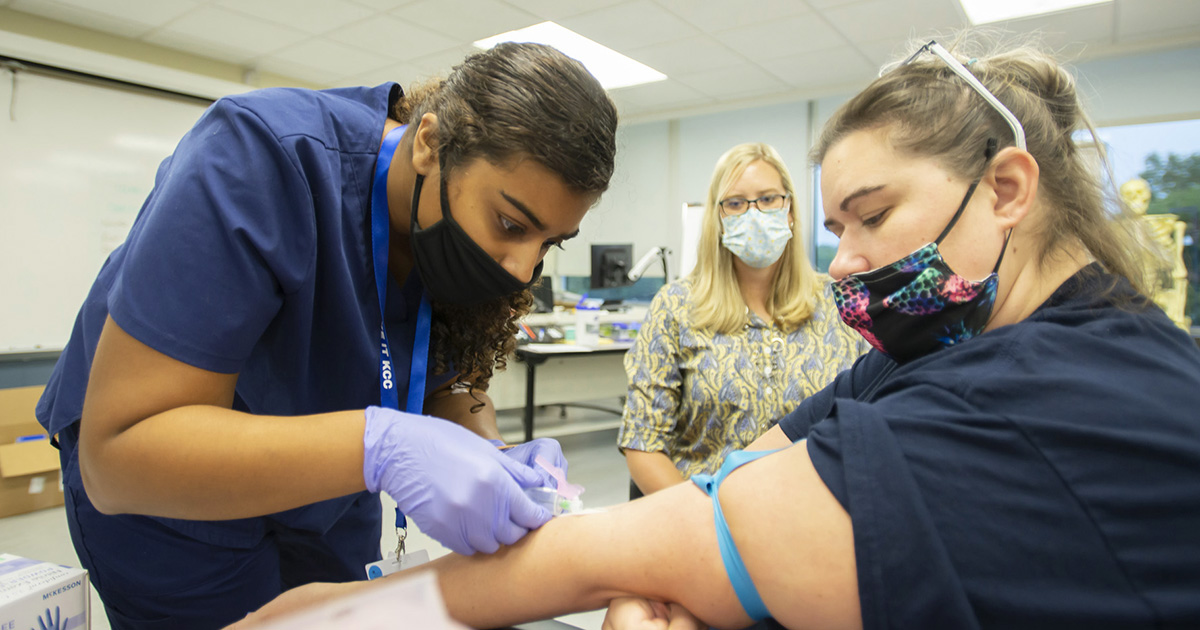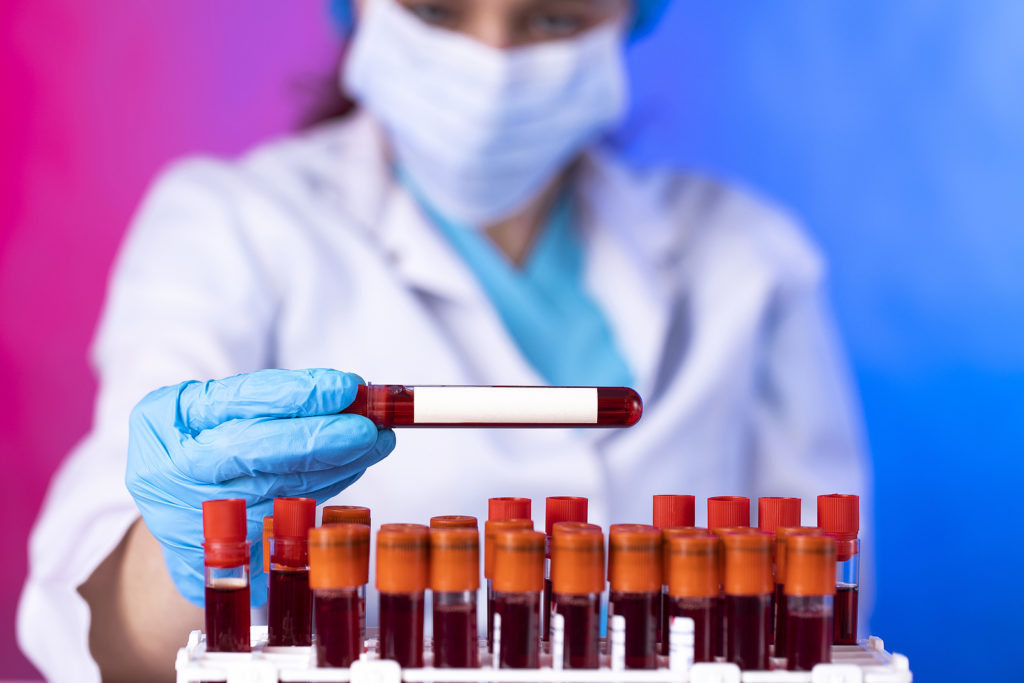The Path to Certification: Comprehending the Phlebotomy Educating Course Journey and Its Value
As you take into consideration the path to accreditation in phlebotomy, it is very important to recognize the role you'll play in healthcare. Your training will cover necessary abilities, from blood collection techniques to patient interaction. Each component of the program prepares you for the difficulties in advance. However what specifically does the trip entail, and why is certification so essential for your future occupation? Let's explore these questions even more.

The Duty of Phlebotomists in Medical Care
Phlebotomists play a necessary function in the healthcare system, acting as the vital link between people and crucial analysis testing. You'll perform blood attracts, guaranteeing samples are collected precisely and safely. Your knowledge helps in identifying medical problems, keeping an eye on health, and leading treatment choices.
In your everyday interactions, you'll require to establish depend on with clients, making them really feel comfy throughout what could be a demanding experience. You're accountable for classifying and handling examples meticulously to avoid contamination or mistakes, which can influence test results.
Yet, you'll frequently work together with doctors and nurses, connecting important information about clients' problems. Your role is basic in maintaining the process in healthcare settings, making sure prompt and exact outcomes. By mastering your skills, you contribute meaningfully to person treatment, making you a vital component of the medical team. Accepting this duty is vital to your success as a phlebotomist.
Introduction of Phlebotomy Training Programs
When discovering phlebotomy training programs, you'll locate numerous kinds made to fit various timetables and learning designs. Each program aids you create essential skills like blood collection and patient interaction. Understanding these options is key to choosing the right path for your career.
Kinds of Educating Programs
Numerous types of training programs are readily available for those looking to become efficient in phlebotomy. Additionally, some healthcare facilities and facilities provide on-the-job training programs, supplying practical experience while you discover. Whatever course you pick, each program aims to furnish you with the essential skills for a successful phlebotomy occupation.

Key Skills Established
Understanding phlebotomy needs a set of key abilities that are created with extensive training programs. Additionally, interaction abilities are essential; you'll need to connect with individuals, discuss procedures, and put them at ease. Each of these abilities is necessary for your success as a licensed phlebotomist, making you a valuable property in any type of healthcare setup.
Key Elements of a Phlebotomy Program
In a phlebotomy course, you'll concentrate on important subjects that prepared for your future career. You'll take part in hands-on training that allows you to use what you've discovered in real-world settings. Both the curriculum and practical experience are essential for your success as a phlebotomist.
Core Curriculum Review
While going after a phlebotomy training program, you'll experience a core educational program developed to outfit you with fundamental skills and expertise. Phlebotomy school. This curriculum normally consists of composition and physiology, concentrating on the circulatory system and comprehending blood parts. You'll also discover around different sorts of blood collection approaches, consisting of venipuncture and capillary puncture methods
In addition, infection control and safety procedures are crucial components, ensuring you understand just how to keep a sterile atmosphere. You'll examine patient communication, stressing communication and empathy, which are important for reducing person anxiousness. Lastly, honest and legal considerations will be addressed, preparing you for real-world duties. This fundamental understanding will allow you to stand out as a phlebotomist and offer quality treatment in scientific settings.
Hands-On Training Experience
Obtaining hands-on experience is an important part of your phlebotomy training program. This useful training allows you to use what you've found out in a real-world setting, enhancing your abilities and confidence. Phlebotomy Courses Near Me.
Furthermore, you'll get the possibility to interact with people, which is vital for developing your interaction skills. This combination of technological efficiency and social skills is essential for your success as a licensed phlebotomist. Inevitably, hands-on training is where theory fulfills practice, strengthening your expertise and readiness for qualification.
Certification and Licensing Needs
Before you can start your job in phlebotomy, it is vital to comprehend the certification and licensing demands that differ by state. Most states need phlebotomists to hold a qualification from a recognized Phlebotomy Courses Near Me organization, such as the National Phlebotomy Organization or the American Culture for Medical Pathology. These accreditations typically include passing an examination that examines your expertise and abilities in the area.
Along with certification, some states have certain licensing needs. You might need to complete a specific variety of hours in professional technique, submit proof of training, or go through a background check. It is essential to investigate your state's regulations to make sure you meet all required requirements.
Remaining educated concerning these needs not just aids you safeguard a position but also enhances your trustworthiness as an expert. By satisfying these demands, you'll be well on your method to an effective occupation in phlebotomy.
Hands-On Training and Practical Experience
Hands-on training and functional experience are crucial parts of your phlebotomy education and learning, as they permit you to use theoretical understanding in real-world circumstances. During your training, you'll take part in supervised venipuncture, find out correct strategies, and come to be aware of different blood collection equipment. This direct participation is essential for constructing your self-confidence and refining your skills.
You'll work very closely with seasoned experts who can guide you via the subtleties of individual interaction and example handling. Each technique session not only reinforces your understanding yet additionally prepares you for the hectic environment of medical care setups.
Additionally, many programs include scientific turnings, enabling you to experience diverse setups, from health centers to outpatient centers. This exposure assists you adapt to various difficulties and patient requirements, ensuring you're well-prepared for your future duty. Accept these opportunities, as they're necessary to ending up being a competent and thoughtful phlebotomist.
Challenges Encountered During Training
While gaining hands-on experience is vital, it's vital to recognize the difficulties that can emerge during your phlebotomy training. Furthermore, understanding the skills required for blood draws takes technique; you might struggle with method originally.
Time monitoring can also be an obstacle, as harmonizing concept, sensible sessions, and personal commitments can feel challenging. You may deal with differing finding out paces among your peers, resulting in feelings of self-doubt if you think you're falling back. Adjusting to the various individualities of teachers can be tough, as each might have an one-of-a-kind teaching design.
Identifying these barriers early on can prepare you for success and aid you create strength throughout your training trip.
Job Opportunities After Qualification

As you get experience, you might also consider concentrating on areas like pediatric or geriatric phlebotomy, dealing with specific person requirements. Some phlebotomists pick to advance their jobs by ending up being laboratory service technicians or pursuing further education and learning in medical care fields.
In addition, your certification can bring about roles in training or managing new phlebotomists, enabling you to share your knowledge. With the health care sector constantly expanding, your abilities will constantly remain in demand, leading the way for a stable and satisfying job. Embrace the possibilities waiting for you!
Frequently Asked Concerns
What Is the Regular Duration of a Phlebotomy Training Training Course?
Phlebotomy training programs usually last around 4 to 8 weeks. You'll engage in hands-on method, class guideline, and online knowing. Completing this training prepares you for qualification and a rewarding profession in health care.
Are Online Phlebotomy Courses Available?
Yes, on the internet phlebotomy training courses are available. They offer versatility and comfort, permitting you to research at your very own rate. Simply verify the program is accredited to satisfy accreditation demands and get beneficial abilities for your job.
Just How Much Does Phlebotomy Training Typically Cost?
Phlebotomy training generally costs between $700 and $2,500, depending on the program and location. You ought to consider elements like course length, included products, and hands-on experience when picking the appropriate training for you.
What Prevail Requirements for Phlebotomy Training?
Typical prerequisites for phlebotomy training often consist of a senior high school diploma or GED, immunizations, and a history check. Some programs may also call for fundamental healthcare expertise or accreditations, ensuring you're planned for hands-on training.
Can I Work While Finishing My Phlebotomy Training?
Yes, you can work while completing your phlebotomy training. Lots of students equilibrium tasks with their studies, however make certain to handle your time efficiently to assure you satisfy both job and training commitments successfully.